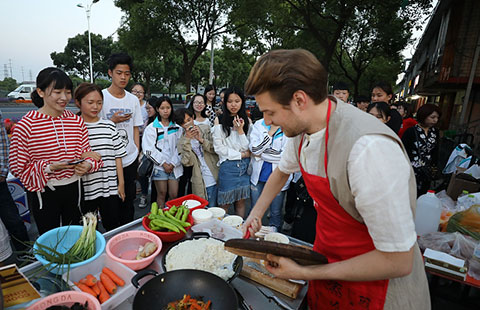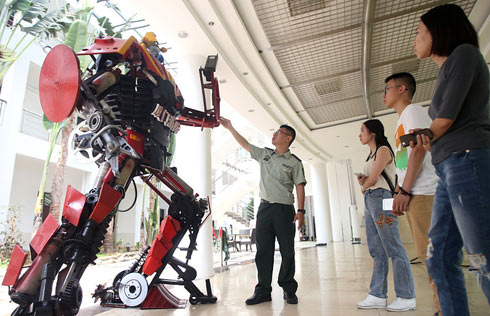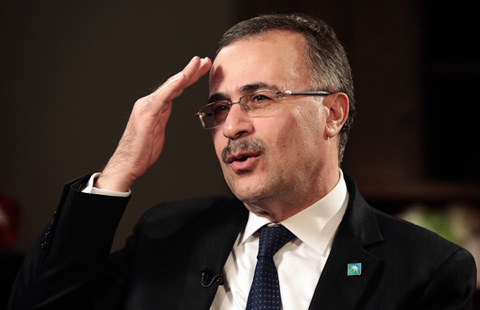Plastic ban fails with ultra-thin bags
The use of ultra-thin plastic bags is still widespread five years after the introduction of a national ban aimed to reduce pollution and save energy, a new report revealed on Thursday.
In April, the National Development and Reform Commission, China's top economic planning agency, said the use of plastic bags had plunged since regulations were brought in on June 1, 2008.
Use in large supermarkets and shopping malls has decreased by more than two-thirds, the NDRC said, while retail outlets saved the equivalent of 1 million metric tons of plastic by handing out 67 billion fewer bags.
The State Council regulation also banned the production, sale and use of super-thin bags — 0.025 mm or less — as well as forbid retailers from offering free plastic bags.
Excessive use of plastic bags had caused sweeping pollution and energy waste, and the regulation was aimed at encouraging companies to produce durable and recyclable bags to reduce emissions.
However, the regulation has not been carried out effectively and super-thin bags are still being used, even at large supermarkets, according to a report by the International Food Packaging Association on Thursday to coincide with the fifth anniversary of the regulation.
The organization surveyed 10 chain supermarkets, 10 open-air markets and three wholesale markets as well as roadside stalls, and discovered that supermarkets have done much better than the others in following the regulation.
All supermarkets provided plastic bags for a fee, but only four supermarkets, including Wal-Mart, provided bags equivalent to or thicker than 0.025 mm, the report said.
In contrast, it added, all open-air and wholesale markets and roadside stalls provided plastic bags for free, and only one out of the 10 open-air markets provided plastic bags thicker than 0.025 mm.
The report specified the suppliers of the six supermarkets found using super-thin bags.
Zhou Shumin, a manager of Beijing Huanludi Plastic Products, which makes plastic bags for Wumart, a supermarket chain in Beijing, admitted that until recently her company made super-thin plastic bags.
Wumart was one of the stores found to offer super-thin bags, according to the International Food Packaging Association. Tests shows the bags sold at a branch in Haidian district were only 0.023 mm thick. A spokesman for Wumart could not be reached for comment on Thursday.
"Our factory may not produce plastic bags any more," Zhou said, explaining that her company was fined 30,000 yuan ($4,800) for violating the regulation.
"Since 2008 when the regulation took effect we have been reducing our production capacity, and the number of our employees has gone from 300 to about 90," she said.
"We're planning to switch to paper bags," she said. "There's more profit."
A vendor selling fruit from a truck near a northeast Beijing subway station who did not want to give his name said he provides two kinds of thin plastic bags to customers for free.
"You can get 50 bags for 2.5 yuan," he said, referring to white bags that feel much thinner than those sold at most supermarkets for 0.2 yuan each. The other kind are yellow, even thinner and cheaper — only 1.8 yuan for 50.
The vendor said he got the bags from a trader who sells in the area, including to some supermarkets.
"Ultra-thin plastic bags are very likely produced by illegal manufacturers with cheap recycled plastics and pose heath risks to consumers if they are used to contain food," Dong Jinshi, deputy director of the International Food Packaging Association, told China Daily on Thursday.
He called on authorities to strengthen supervision on the manufacturing and sale of plastic bags to prevent them from entering the market.
"Moreover, the government can preferentially encourage enterprises to improve research and development into more environmentally friendly policies, such as tax reductions," he said.
Jiang Shouhua, a senior engineer at the Ministry of Environmental Protection's Environmental Certification Center, said reducing the use of plastic bags is more important due to the lack of an effective system to properly recycle them.
"A market-oriented mechanism should be set up to encourage plastic recycling," he said.























